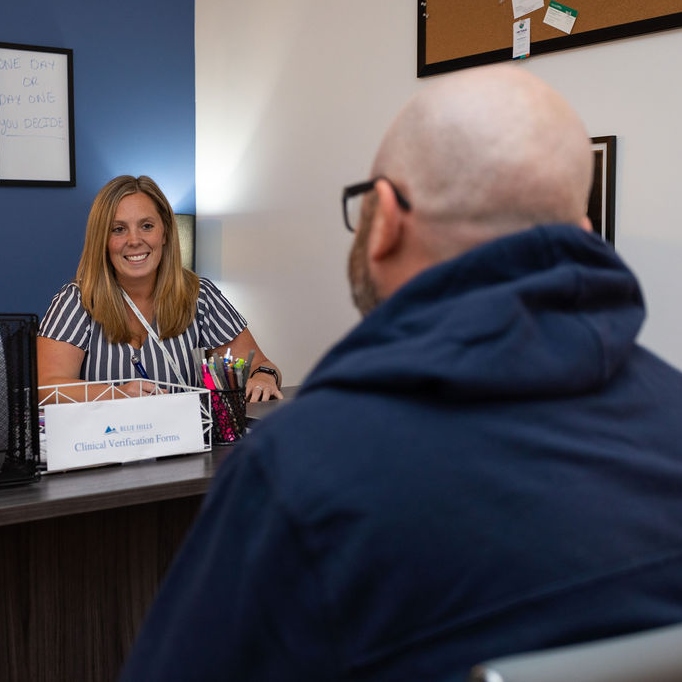Mental Health Conditions
Mental health problems affect many people throughout the United States regardless of economic status, education level, or other factors.
If you are facing a mental disorder, you can find a range of treatments, from psychiatry to psychotherapy, that can help you build the life you want.
Blue Hills Recovery can help you or your family members overcome a mental disorder by developing a treatment plan that empowers you to manage your condition.
What are Mental Health Disorders?
Mental health disorders are a range of conditions that affect your emotional and behavioral well-being. These conditions impact how you:
- Feel about yourself
- Interact in social and work environments
- Take care of yourself
- Function in day-to-day living
- Relate to friends, family, and strangers
Treatment is available from qualified professionals who can help.
At Blue Hills Recovery, we help people with mental health conditions address low self-esteem, poor behavioral health, self-harm, and even suicidal thoughts.

What Causes Mental Health Conditions?
While mental health disorders are medical conditions, there isn’t a single cause or contributing factor that results in mental illness. However, common risk factors have been linked to the onset of mental health conditions.
These factors can include genetics, physical health, living with long-term stressors, and behavioral health, but no one cause will lead to depression, schizophrenia, or other conditions.
Risk Factors for Mental Illness
While risk factors for mental illness can include some behavioral health issues, many factors are out of your control. These may include:
- Experiencing a traumatic event
- Experiencing stress or abuse
- Family history of mental illness
- Having a serious medical condition like cancer
- Having a chronic medical condition
- Chemical imbalances in your brain
- Exposure before birth to illicit substances, toxins, or viruses
- Experiencing a traumatic brain injury
- Substance use or alcohol addiction

Who is Affected by Mental Health Disorders?
Mental illness can affect anyone. But that doesn’t mean that if you have addiction risk factors that you will automatically get a mental health disorder.
However, it does help explain why 20% of adults experience a mental health disorder every year. And about 5% experience a serious mental illness each year. Mental illness can also begin in children, adolescents, and young adults.
According to the National Alliance on Mental Illness (NAMI), half of mental illnesses that last a lifetime begin by age 14, and three-quarters of them begin by age 24. But with timely treatment, you can learn to manage a mental disorder.
Signs & Symptoms of Mental Health Disorders
Mental health disorders each come with their own set of signs, symptoms, and resulting behaviors. That said, the onset of mental illness does come with common signs and symptoms. These warning signs and common symptoms include:
- Extreme mood swings
- Excessive worry
- Inability to stop feeling angry
- Difficulty concentrating or understanding others
- Change in hygiene such as eating or sleeping
- Lack of self-awareness or insight
- Change in sex drive
- Substance abuse
- Inability to deal with stress
- Suicidal thoughts
If you are experiencing some of these symptoms, talk to a mental health professional to see if treatment is appropriate.
Types of Mental Health Disorders
Mental illness can affect you in different ways, depending on what kind of mental illness you are experiencing. These mental disorders each come with a unique set of symptoms.
While there are common symptoms and signs of mental illness, there are also specific symptoms of each mental health disorder and ways that they intensify common symptoms.
Anxiety Disorders
Anxiety disorders interfere with daily life by creating an ongoing sense of dread and overwhelming fear.
This kind of anxiety can be generalized or it can relate to a specific thing or situation. Anxiety disorders include:
- Generalized anxiety disorder: Symptoms include excessive worry, restlessness, headaches, and irritability.
- Obsessive-compulsive disorder (OCD): Symptoms are obsessions over certain things or situations leading to compulsions a person must carry out for relief.
- Panic disorder: Symptoms include sweating, racing heart, and a feeling of being out of control or of facing an impending doom.
- Phobias: Phobias manifest in an irrational fear of coming across a specific object or situation such as certain animals, flying, heights, or blood.
The best treatment for anxiety disorders is psychotherapy through the therapeutic model of cognitive behavioral therapy (CBT). Blue Hills Recovery offers treatment using CBT.
Attention Deficit Hyperactivity Disorder (ADHD)
ADHD is a developmental disorder that commonly affects children and teens, but it can affect adults as well. It can also co-occur with conduct disorder, which is characterized by aggressive behavior.
Symptoms of ADHD interfere with concentration and can negatively impact relationships, school, and work. Symptoms of ADHD include:
- Troubles staying on task
- Being disorganized
- Excessively fidgety or talkative
- Extremely restless
- Interrupting others
- Acting without thinking first
- Difficulty controlling impulses
ADHD treatment often includes medication that falls into two categories: stimulants and non-stimulants. Stimulants increase chemicals in the brain (such as dopamine) that have to do with attention and work right away. Non-stimulants take longer to work but are also effective.
Depression & Mood Disorders
Depression (or depressive disorder) is one kind of mood disorder. It is more common than the others, affecting 8% of adults and 15% of teenagers in America.
Depressive disorder can be severe and come in the form of seasonal affective disorder and perinatal depression. It can also come with psychosis. Symptoms include:
- Feeling sad
- Hopelessness
- Feeling frustrated
- Feeling worthless
- Difficulty concentrating
Bipolar disorder, another mood disorder, also affects adults and teens alike. Formerly called manic depression, bipolar disorder causes extreme shifts in mood that create manic highs and depressive lows, making it hard to function.
Treatment at Blue Hills Recovery for depression and mood disorders can include medication as well as CBT.
Personality Disorders
According to the American Psychiatric Association, personality disorders cause distress and inhibit healthy functioning over a long period of time. These disorders affect the way you:
- Think about yourself and others
- Control your behavior
- Relate to other people
- Respond emotionally
Personality disorders include:
- Borderline personality disorder in which a person has intense emotions (including inappropriate anger), impulsivity, and a poor self-image.
- Antisocial personality disorder in which a person chronically disregards boundaries and the rights of others.
There are other personality disorders, all of which create a pattern of behavior that disrupts the individual’s life and the lives of others. But personality disorder treatment is available at Blue Hills Recovery through CBT, group therapy, and education.
Post Traumatic Stress Disorder
Post-traumatic stress disorder (PTSD) can develop after someone has experienced a traumatic, frightening, or dangerous situation that has triggered the fight-or-flight response.
It is common to feel a range of emotions after experiencing a trauma. In most cases, these feelings resolve after some time. PTSD can develop if you are experiencing fear, stress, and feeling unsafe even when you are not in danger.
PTSD is commonly associated with combat veterans, but anyone can develop this disorder who has experienced or witnessed:
- Abuse
- A disaster
- An accident
- Sexual assault
- Physical assault
- Other traumatic situations or events
Fortunately, you can find PTSD treatment at Blue Hills Recovery through trauma therapy. This form of therapy has many benefits, including less risk of complications from taking medications. It also works faster than talk therapy or medications alone.
Other Mental Health Disorders
There are other mental health disorders that can affect your life. Blue Hills Recovery treats eating disorders such as bulimia nervosa and anorexia and helps you address lack of appetite and dramatic weight loss through CBT and family therapy.
While Blue Hills Recovery does not offer specific treatments for the following disorders, it is important to be aware of them if you or a loved one are facing mental illness. These include:
- Dissociative disorders which involve the lack of connection between behavior, memory, identity, feelings, and thoughts.
- Psychotic disorders that involve abnormal thinking and perception.
- Autism spectrum disorder, a neurological and developmental disorder that affects how people learn, communicate, and interact with others.
What Happens When Mental Health Disorders Go Untreated?
Facing a mental illness can be difficult, but letting it go untreated can result in unwelcome and detrimental complications. These can include:
- Experiencing housing insecurity or homelessness
- Poor quality of life
- Substance use disorder
- Disability
- Unemployment
- Incarceration
- Suicide
If you are facing mental illness, don’t let it go untreated. At Blue Hills Recovery, we can answer any questions or reservations you may have about the process.
Mental Health Treatment in Worcester, Massachusetts
Having a mental illness can make you feel lonely and isolated, but you can overcome and learn to manage a mental health disorder at Blue Hills Recovery.
We offer a range of evidence-based treatment programs and therapies and an individualized treatment plan that gives you the tools you need to get your life back.
Mental Health Day Treatment
Our mental health day treatment program offers inpatient-level care with the flexibility of an outpatient program. You will experience highly structured treatment throughout the day learning to address thought patterns and challenging situations.
You will interact with providers in individual therapy, group therapy, and family therapy which will give you a strong place from which to begin stepping down to other outpatient levels of care.
Mental Health Evening Programs
Our mental health evening program is a step down if you have completed the day program. We typically structure treatment plans to transition you out of the program.
The evening program lasts for several hours on three to five evenings a week, depending on what your needs are. This gives you continued treatment and access to our caregivers if anything should come up for you at home or work.
Mental Health IOP
In our mental health IOP, you can access many of the same treatments as in the day and evening programs, but fewer days per week and fewer hours per day.
IOP is the next level of care following day or evening treatment, which are typically more intensive treatment programs for people who are newly in recovery.
Mental Health Therapies
Mental health therapies at Blue Hills Recovery include a range of evidence-based therapies and alternative therapies.
In addition to group, family, and individual therapy, we provide cognitive behavioral therapy to help you identify and change unhelpful thought patterns or trauma recovery therapy if you are facing PTSD.
We also provide alternative therapies that teach you wellness, mindfulness, and other helpful approaches to managing your condition. Other alternative therapies include music therapy and adventure therapy.
Get Expert Mental Health Treatment in Worcester at Blue Hills Recovery
You don’t have to face mental illness alone. Blue Hills Recovery offers compassionate and professional treatment to help you address mental health disorders.
Through evidence-based and alternative therapies, you can find relief from the symptoms of depression, PTSD, anxiety disorders, and other mental health conditions.
We also provide dual diagnosis treatment for co-occurring substance use disorders, so find freedom today. Reach out to us to learn more about our treatment programs.
Mental Health Treatment in Worcester FAQs
What is the best treatment for mental health?
How effective is mental health care?
Can treatment cure mental illness?
Sources
Let’s talk about how we can help.
A Life of Healing Can be Yours.
You deserve to become your best self. With decades of combined experience in the field of addiction medicine, our staff knows what it takes to build a foundation for recovery.